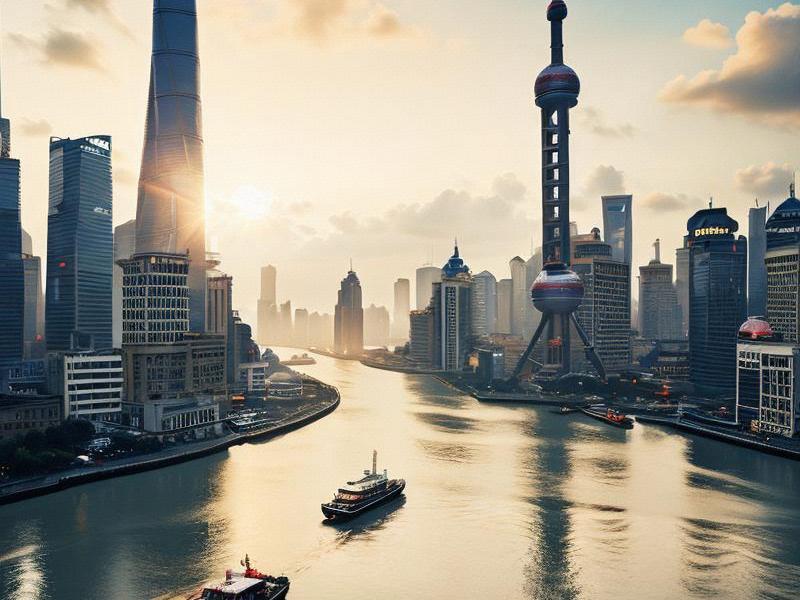
Shanghai, often referred to as the "Pearl of the Orient," has a history that dates back thousands of years. However, it was in the 19th century that the city began to transform into the cosmopolitan city we know today. The opening of the port to foreign trade in 1843 marked the beginning of Shanghai's meteoric rise. By the early 20th century, it had become one of the world's most important financial centers, a status it continues to hold.
The city's urban development is nothing short of remarkable. The skyline of Shanghai is dominated by iconic structures such as the Oriental Pearl Tower, the Jin Mao Tower, and the Shanghai Tower, which is the tallest building in China and the second-tallest in the world. These modern marvels stand in stark contrast to the city's historic areas, such as The Bund and the French Concession, which showcase a blend of colonial architecture and traditional Chinese design.
The Bund, with its row of historical buildings, offers stunning views of the Pudong skyline across the Huangpu River. It is a popular spot for both locals and tourists, who come to admire the city's architectural splendor and take in the vibrant atmosphere. The French Concession, on the other hand, is known for its charming streets lined with cafes, boutiques, and art galleries, providing a glimpse into the city's colonial past.
Culturally, Shanghai is a melting pot of influences. The city is home to a diverse population, including people from all over China and the world. This diversity is reflected in the local cuisine, which combines elements of traditional Shanghainese cooking with international flavors. Dishes such as xiaolongbao (soup dumplings), shengjianbao (pan-fried dumplings), and the famous Shanghainese fried rice are must-tries for food enthusiasts.
419上海龙凤网 Shanghai's cultural scene is also thriving. The city boasts numerous museums, theaters, and art galleries, including the Shanghai Museum, which houses an impressive collection of Chinese art, and the Power Station of Art, a former power plant turned contemporary art museum. The city hosts a variety of cultural events throughout the year, such as the Shanghai International Film Festival and the Shanghai Fashion Week, attracting artists, filmmakers, and designers from around the globe.
Economically, Shanghai is a powerhouse. It is the largest city in China by population and the second-largest by GDP. The city is a major center for finance, trade, and manufacturing, with the Shanghai Stock Exchange being one of the largest in the world. The Pudong New Area, developed in the late 20th century, is home to many of the city's financial institutions and multinational corporations.
The city's strategic location on the East Coast of China, coupled with its well-developed infrastructure, makes it a key player in global trade. Shanghai's free trade zone has further solidified its position as a hub for international commerce. The city is also a leader in innovation and technology, with a burgeoning startup scene and a strong focus on research and development.
爱上海419论坛 Despite its rapid development, Shanghai has made significant efforts to preserve its environment. The city has invested in green initiatives, such as the construction of the world's first commercial high-speed magnetic levitation (maglev) train, which connects the city center with Pudong International Airport. Shanghai is also home to numerous parks and green spaces, including Century Park and Zhongshan Park, providing residents and visitors with places to relax and enjoy nature.
Education is another area where Shanghai excels. The city is home to some of the best universities in China, including Fudan University and Tongji University, attracting students from all over the country and abroad. These institutions are known for their academic excellence and research contributions, further enhancing Shanghai's reputation as a global city.
Shanghai's transportation network is one of the most efficient in the world. The city has an extensive metro system, which is clean, reliable, and affordable, making it easy for residents and tourists to get around. Additionally, the city's airport, Hongqiao International Airport and Pudong International Airport, serves as a major gateway for international and domestic flights.
上海龙凤阿拉后花园 Tourism is a significant industry in Shanghai, with millions of visitors coming to the city each year. In addition to its historical and cultural attractions, Shanghai offers a wide range of entertainment options, from shopping at luxury malls like IFC Mall and Plaza 66 to enjoying the nightlife in areas such as Nanjing Road and Xintiandi.
In conclusion, Shanghai is a city that truly embodies the spirit of modern China. Its rapid urban development, rich cultural heritage, and status as a global economic hub make it a fascinating place to explore. Whether you are interested in history, culture, or the latest trends, Shanghai has something to offer for everyone. The city's ability to blend tradition with innovation is a testament to its resilience and adaptability, ensuring that it remains a beacon of progress and prosperity on the global stage.
